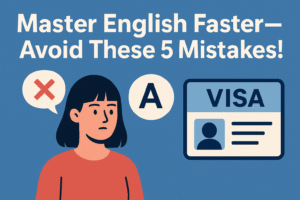5 Common Mistakes in English Learning Every Student Should Avoid

Introduction : Basic English Communication
Learning basic English communication is a powerful skill that opens doors to education, jobs, and opportunities abroad.
Whether you’re a student preparing for a visa interview, a migrant starting a new career, or simply improving your daily conversations,
mastering English doesn’t have to be overwhelming.
In this guide, we’ll walk you through five best steps to learn basic English communication, perfect for beginners aiming to build confidence and fluency.
1. Build a Strong English Vocabulary Foundation
Vocabulary is the building block of any language. Without a solid word bank, even simple conversations can feel impossible.
-
Why it matters: A rich vocabulary helps you express ideas clearly and understand others.
-
How to do it:
-
Start with common words and phrases you’ll use daily (e.g., greetings, directions, food items).
-
Use flashcards or mobile apps like Duolingo or Memrise.
-
Learn words in context by reading short stories, captions, or English blogs.
Pro tip: Focus on phrases instead of single words—“Can I get some water?” is more useful than just knowing “water.”
-
2. Practice English Speaking Every Day
Many learners study grammar or vocabulary but avoid speaking until they feel “ready.” This is a big mistake—fluency comes from practice, not perfection.
-
Why it matters: Speaking builds confidence and helps you think in English instead of translating from your native language.
-
How to do it:
-
Speak with a friend, join a local language club, or find a conversation partner online.
-
Record yourself reading short sentences and listen for improvement.
-
Don’t fear mistakes—they’re part of the learning process.
Pro tip: Use a mirror to practice pronunciation. Seeing your expressions and mouth movements makes speaking more natural.
-
3. Improve English Listening Skills Through Immersion
Listening is as important as speaking when learning basic communication. The more you hear English, the easier it becomes to understand and respond.
-
Why it matters: Strong listening skills help you follow conversations, lectures, and even visa interviews.
-
How to do it:
-
Watch English movies or TV shows with subtitles, then without.
-
Listen to podcasts or YouTube channels designed for English learners.
-
Repeat what you hear—this technique, called shadowing, sharpens both listening and pronunciation.
Pro tip: Choose content that matches your interests (e.g., cooking, travel, or sports) to keep motivation high.
-
4. Learn Basic English Grammar Without Overcomplicating
Grammar provides the structure to build sentences, but overthinking rules can slow you down.
-
Why it matters: Correct grammar makes your communication clear and professional, especially for academic or visa-related purposes.
-
How to do it:
-
Start with essential tenses: present, past, and future.
-
Practice forming simple sentences: subject + verb + object (“I like apples”).
-
Use grammar apps or beginner-friendly textbooks for structured lessons.
Pro tip: Focus on speaking correctly in simple sentences before tackling advanced grammar rules.
-
5. Stay Consistent and Use English in Real Life
Consistency is key—studying for a week and stopping won’t get results. The best learners make English part of their daily routine.
-
Why it matters: Regular exposure helps your brain adapt and makes English feel natural.
-
How to do it:
-
Set small, achievable goals, like learning five new words a day.
-
Switch your phone or social media language settings to English.
-
Engage with English content: comment on blogs, ask questions in online forums, or write short daily journal entries.
Pro tip: Celebrate small wins. Even understanding a short news article or asking for directions in English is progress worth noticing.
-
In Short…….
These five best steps to learn basic English communication
- building vocabulary, practicing speaking,
- improving listening, mastering simple grammar, and staying consistent
- will set you on the path to success. Whether you’re applying for a student visa, planning to migrate, or improving your career prospects,
- English communication skills are your gateway to global opportunities.
- Start small, stay patient, and remember : every word you learn brings you closer to your dreams.


